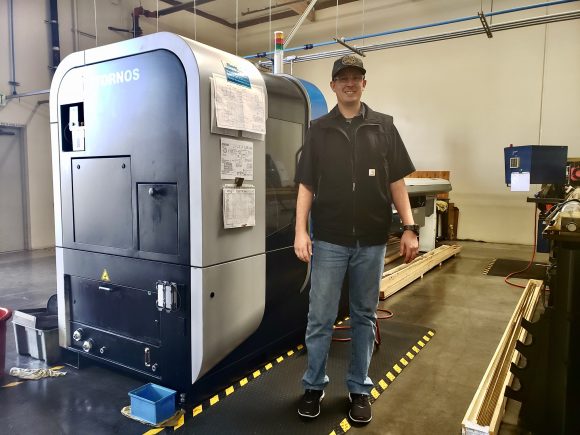Today’s podcast guest is Travis Erickson of Precision Components of Oxnard, California. Precision Components runs Tornos CNC Swiss lathes, specializing in producing custom mil-spec contacts primarily for the aerospace industry. Travis and his father handle all of the company’s machining and quality duties and employ only three people in their shop.
Scroll down to listen to the podcast.
Main points of the interview
(2:50) Travis explains the core of his company’s business, custom mil-spec electrical contacts that go into circular connectors for large OEM aerospace companies. The company produces parts ranging from 16mm all the way down to .0013mm.
(4:45) Travis talks about the Tornos Swiss machines at Precision Components. The company has nine DECO 10, a DECO 13a, an EvoDECO 16, and an old ENC 162 which Travis says is practically older than him. Travis says his father bought the first Tornos DECO sold in the United States in 1997 or 1998, a DECO 10 that is still running in the shop today. Travis says the company’s EvoDECO 16 cost around $400,000 new after freight and options. He says possibly other Swiss brands could do the company’s work, but he has no plans to switch because he knows Tornos machines produce the tolerances he needs.

(7:24) Travis talks about the history of Precision Components. His father started the company in 1988. Travis says he is 34 years old and has been working at the company for 11 years since finishing college at U.C. Berkley. The company is literally right around the corner from the Haas Automation factory, but it has never had the need for any Haas machines.
(9:45) Travis says Precision Components doesn’t advertise with a website, despite his degree in marketing. He says the company has a core group of reliable customers, and right now he is not concerned with striving for huge growth.
(10:30) Travis says aside from he and his dad there are only three guys who work in their company’s shop. They handle tasks like parts cleaning, tumbling, deburring, light assembly and monitoring the machines. Travis’s Dad is the primary machine setup person and operator, while Travis handles quality and the company’s business responsibilities. Travis says the company at one point had 11 total people, including two setup guys, but it downsized in 2009-2010, and the setup people left to explore other opportunities. He and his father realized that the company could operate successfully with a much leaner but efficient workforce.
(15:05) Travis says he thinks the machining business will slow down next year because of the Presidential election. He says that the “big boys” like Boeing and Raytheon typically buy a lot of inventory leading up to an election and then wait to see what happens before they start funding new projects.
(17:10) Travis says he knows it will be important to grow more and invest in some employees in the near future now that he is starting a family.
(21:30) Travis talks about the challenges of running a machining company in California such as state taxes, hazardous waste permits and wild fires (which caused this podcast interview to be postponed a week).
Question: Do you wish your machine shop was larger or smaller?
Podcast: Play in new window | Download

4 Comments
Our shop is small, only 3 with a part time 4th, and a small machine tending robot on the way- that is enough. It can be hard to offer attractive benefit packages with a company our size. Despite that, in the end we do alright and while I love what I do, I have other things in life I love as well and are not going to sacrifice those for endless growth or profit.
human nature is what it is.
I think most of us have a dominant “gatherer” gene. 🙂
So we will end up filling up whatever space we have regardless of how much room we can get a hold of.
As support of my argument, look how many storage units keep poping up.
How many have garages filled with “stuff” (junk) and a new car sitting in the elements.
People pay tons of money each and every day, to store JUNK!
When you see what people have in those units , IT IS JUNK.
As die makers and machinists, we know we can make just about anything with almost nothing, so we save every little cutoff, half finished parts, etc… and we are always hoping for that repeat job! So we have tons of jigs, fixtures and tooling from the many projects over the years.
And like most I cannot make up my mind if I want more room or be forced to clean out.
Did you ever notice when you finally discard or re-purpose tooling, shortly that old job comes around again…
Yes, you always need it right after you get rid of it! 🙂
I wish I did have more physical space but I don’t really want to grow the business any more. I have a Swiss shop in So Cali as well and it’s slim pickings for employees that are worth their pay let alone talented enough to work in a shop. So from a managing/business owner perspective I feel it’s best to leave my business size alone and then think of expansion when I have a work force that can support the growth.
And yes I do hang on to that old fixture or that broken tool or that left over bar remnant, but I’m very selective as to what I keep otherwise the shop will look like a junk yard. And yes the day after you throw it away does always seem to be the day you end up needing it!